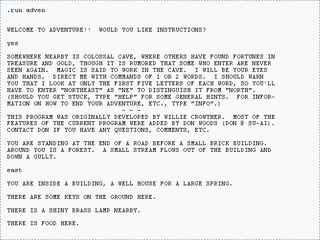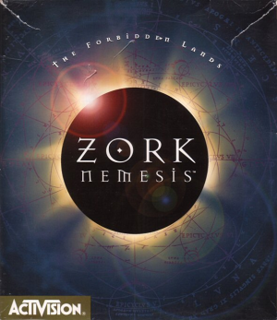Infocom was an American software company based in Cambridge, Massachusetts, that produced numerous works of interactive fiction. They also produced a business application, a relational database called Cornerstone.

Interactive fiction, often abbreviated IF, is software simulating environments in which players use text commands to control characters and influence the environment. Works in this form can be understood as literary narratives, either in the form of interactive narratives or interactive narrations. These works can also be understood as a form of video game, either in the form of an adventure game or role-playing game. In common usage, the term refers to text adventures, a type of adventure game where the entire interface can be "text-only", however, graphical text adventures still fall under the text adventure category if the main way to interact with the game is by typing text. Some users of the term distinguish between interactive fiction, known as "Puzzle-free", that focuses on narrative, and "text adventures" that focus on puzzles.
Zork is an interactive fiction computer game. It was originally developed by four members of the MIT Dynamic Modelling Group — Tim Anderson, Marc Blank, Bruce Daniels, and Dave Lebling — between 1977 and 1979 for the DEC PDP-10 mainframe computer. The four founded the company Infocom in 1979 and released Zork as a commercial game for personal computers, split into three parts due to memory limits of personal computers compared to the mainframe system. The three titles released commercially were Zork: The Great Underground Empire – Part I in 1980, Zork II: The Wizard of Frobozz in 1981, and Zork III: The Dungeon Master in 1982. The game has since been ported to numerous systems.

Steven Eric Meretzky is an American video game developer. He is best known for creating Infocom games in the early 1980s, including collaborating with author Douglas Adams on the interactive fiction version of The Hitchhiker's Guide to the Galaxy, one of the first games to be certified "platinum" by the Software Publishers Association. Later, he created the Spellcasting trilogy, the flagship adventure series of Legend Entertainment. He has been involved in almost every aspect of game development, from design to production to quality assurance and box design.

Peter David Lebling is an interactive fiction game designer (implementor) and programmer who has worked at various companies, including Infocom and Avid.

Leather Goddesses of Phobos is an interactive fiction video game written by Steve Meretzky and published by Infocom in 1986. It was released for the Amiga, Amstrad CPC, Amstrad PCW, Apple II, Macintosh, Atari 8-bit family, Atari ST, Commodore 64, TI-99/4A and MS-DOS. The game was Infocom's first "sex farce", including selectable gender and "naughtiness"—the latter ranging from "tame" to "lewd". It was one of five top-selling Infocom titles to be re-released in Solid Gold versions. It was Infocom's twenty-first game.

Brian Moriarty is an American video game developer who authored three of the original Infocom interactive fiction titles, Wishbringer (1985), Trinity (1986), and Beyond Zork (1987), as well as Loom (1990) for LucasArts.

Zork: Grand Inquisitor is a graphic adventure game developed and published by Activision, and released for Windows in 1997; a second edition for Macintosh was released in 2001. The game is the twelfth in the Zork series, and builds upon both this and the Enchanter series of interactive fiction video games originally released by Infocom. The game's story focuses on the efforts of a salesperson who becomes involved in restoring magic to Zork while thwarting the plots of a tyrannical figure seeking to stop this. The game features the performances of Erick Avari, Michael McKean, Amy D. Jacobson, Marty Ingels, Earl Boen, Jordana Capra, Dirk Benedict, David Lander and Rip Taylor.

Starcross is a 1982 interactive fiction game written by Dave Lebling and published by Infocom. The game was released for the IBM PC, Apple II, Atari 8-bit family, Commodore 64, TRS-80, Texas Instruments TI-99/4A, and later the Atari ST and Amiga. It was Infocom's fifth game and first in the science fiction genre. Starcross takes place in the year 2186, when the player's character is a lone black hole miner exploring an asteroid belt. It sold 90,315 copies.

Enchanter is a 1983 interactive fiction computer game written by Marc Blank and Dave Lebling and published by Infocom. The first fantasy game published by Infocom after the Zork trilogy, it was originally intended to be Zork IV. The game has a parser that understands over 700 words, making it the most advanced interactive fiction game of its time. It was Infocom's ninth game.

Zork Nemesis: The Forbidden Lands is a graphic adventure game developed by Zombie LLC, published by Activision, and released in 1996 for Windows 95, MS-DOS, and Macintosh. It is the eleventh game in the Zork series, and the first title not to be marketed under the Infocom label, while featuring a darker, less comical story within the Zork setting. The story focuses on players investigating the sudden disappearance of four prominent figures and their children to the hands of a mysterious being known as the "Nemesis", and uncovering a sinister plot during their investigations that they must thwart. The game features performances by Lauren Koslow, W. Morgan Sheppard, Allan Kolman, Stephen Macht, Paul Anthony Stewart, Merle Kennedy, and Bruce Nozick.

Beyond Zork is an interactive fiction computer game written by Brian Moriarty and released by Infocom in 1987. It was one of the last games in the Zork series developed by Infocom. It signified a notable departure from the standard format of Infocom's earlier games which relied purely on text and puzzle-solving: among other features, Beyond Zork incorporated a crude on-screen map, the use of character statistics and levels, and RPG combat elements.

Deadline is an interactive fiction video game published by Infocom in 1982. Written by Marc Blank, it was Infocom's third game. It was released for the Amstrad CPC, Apple II, Atari 8-bit family, Commodore 64, IBM PC, Osborne 1, TRS-80, and later for the Amiga and Atari ST.

Zork: The Great Underground Empire - Part I, later known as Zork I, is an interactive fiction computer game written by Marc Blank, Dave Lebling, Bruce Daniels, and Tim Anderson and published by Infocom in 1980. It was the first game in the Zork trilogy and was released for a wide range of computer systems, followed by Zork II and Zork III. It was Infocom's first game, and sold 378,000 copies by 1986.

Marc Blank is an American game developer and software engineer. He is best known as part of the team that created one of the first commercially successful text adventure computer games, Zork.
Michael Berlyn is an American video game designer and writer. He is best known as an implementer at Infocom, part of the text adventure game design team.

Zork II: The Wizard of Frobozz is an interactive fiction computer game published by Infocom in 1981. It was written by Marc Blank, Dave Lebling, Bruce Daniels and Tim Anderson. It was the second game in the popular Zork trilogy and was released for a wide range of computer systems. It begins where Zork I left off and leads into Zork III. It is Infocom's second game.

Zork III: The Dungeon Master is an interactive fiction computer game written by Marc Blank, Dave Lebling, Bruce Daniels, and Tim Anderson and published by Infocom in 1982. Infocom's fourth game, it's the third game in the Zork trilogy. It was released for the Amstrad CPC, Apple II, Atari 8-bit family, Commodore 64, CP/M, IBM PC, MSX, TRS-80, then later for Macintosh, Atari ST, and Amiga.
Implementer was originally the self-given name of the creators of the Infocom text adventure series Zork. Implementor, often shortened to Imp, became the title given to game designers and programmers at Infocom. Implementers were inserted as minor characters in several Infocom games. The game Beyond Zork also includes a group of characters called Implementors, minor deities who are integral to the plot. The term carried over into MUDs, particularly DikuMUDs, where it usually refers to a game's owner or owners, similarly to the term "God".
Classic Text Adventure Masterpieces of Infocom is a collection of 33 computer games from interactive fiction pioneer Infocom, and the top 6 winners of the 1995 Interactive Fiction Competition, released in 1996. All 39 games are combined on a single cross-platform CD-ROM, which also includes PDFs of all the Infocom games' instructions, maps, and hint booklets.















